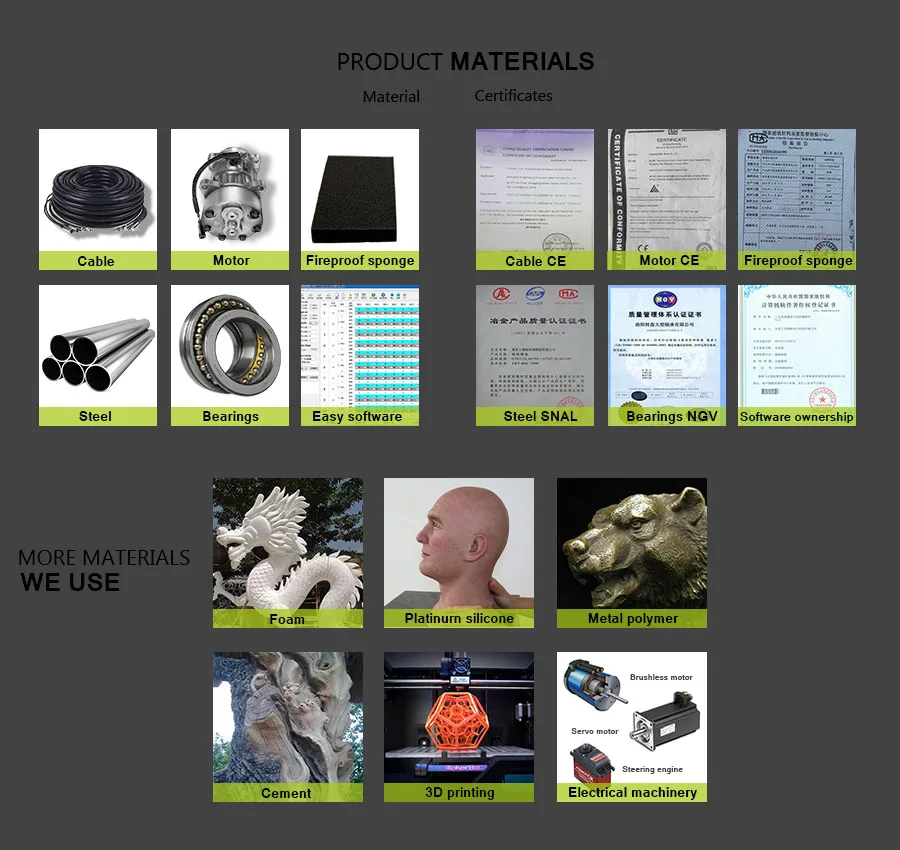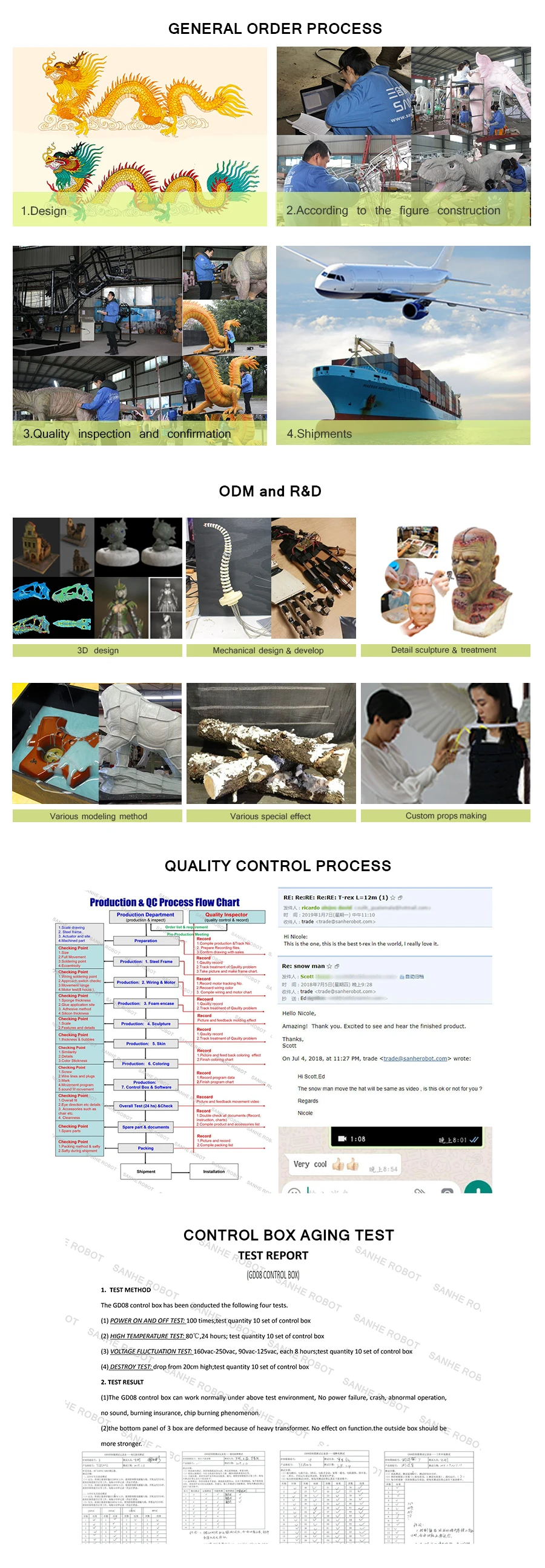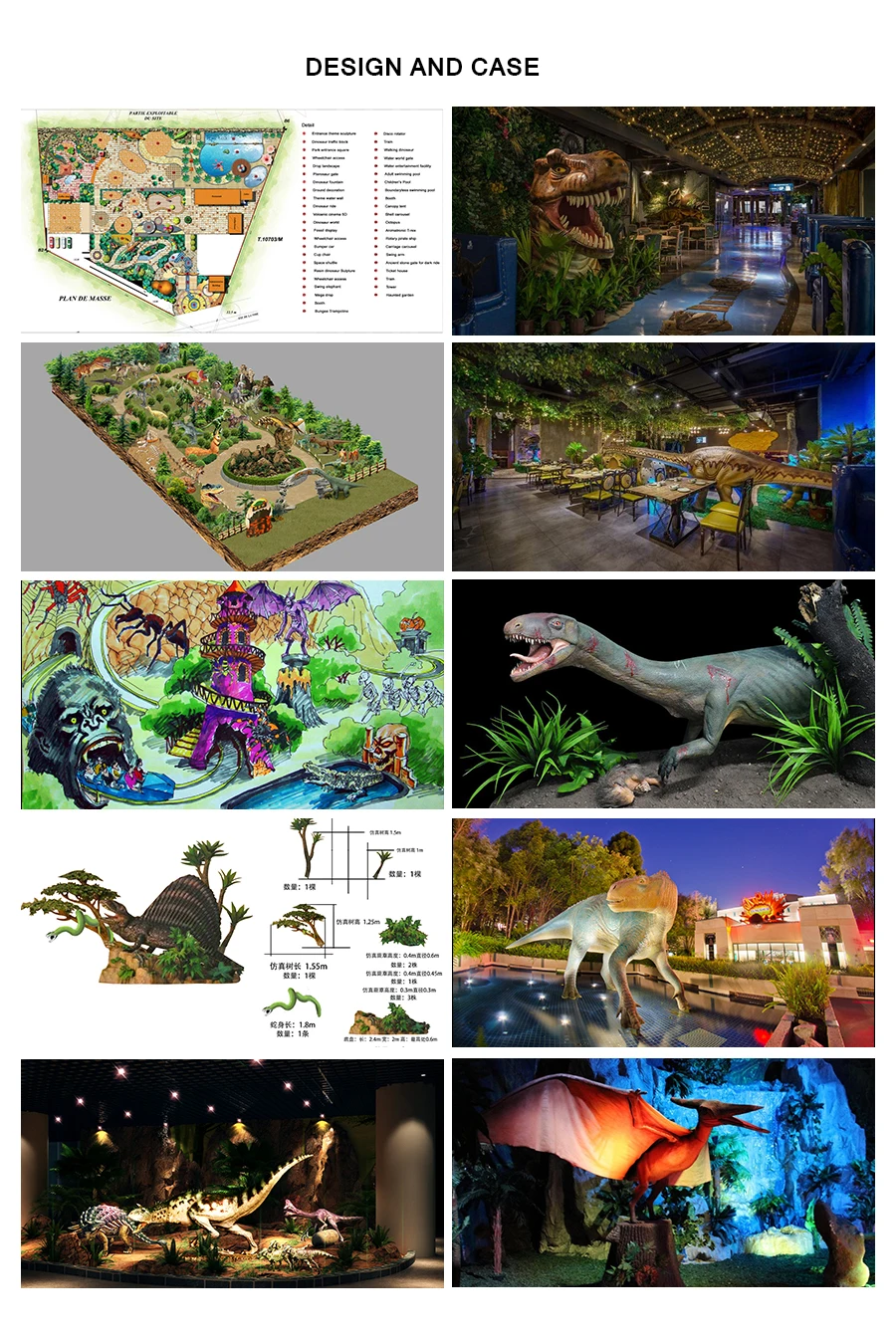

| Input | AC 110/220V ,50-60HZ |
| Plug | Euro plug / British Standard / SAA / C-UL / or depends on request |
| Control mode | Automatic / Infrared / remote / coin / Button / Voice / Touch / Temperature / shooting etc. |
| Waterproofing grade | IP66 |
| Working condition | Sunshine, rain, seaside, 0~50℃(32℉~82℉) |
| Optional function | Sound can be increased to 128 kinds Smoke,/ water. / bleed / smell / change color / change lights / LED screen etc interactive(Location tracking) / conversine(currently only Chinese) |
AFTER-SALE SERVICE
| Service | Need be cut for shipping,fwill provide a detailed installation manual. |
| Warranty | We provide 2 years warranty for all of our antrimatronic models, the warranty pieriod starts from freight arrives at destination port. Our warranty covers motor, reducer, control box, etc. |






 Mechanical animal simulation animal artificial anima
realistic animal statue life size animal model vivid animal statues animatronic animal animal model simulation animals artificial animal outdoor playground life size animal outdoor playground animatronic animals robot animals life size resin animals customized lizard sculpture lifelike animal model animal replica life size custom statue life size animal decoration custom life size animal realistic animal statue
Lizards are a widespread group of squamate reptiles, with over 6,000 species, ranging across all continents except Antarctica, as well as most oceanic island chains. The group is paraphyletic as it excludes the snakes and Amphisbaenia; some lizards are more closely related to these two excluded groups than they are to other lizards. Lizards range in size from chameleons and geckos a few centimeters long to the 3 meter long Komodo dragon.
Most lizards are quadrupedal, running with a strong side-to-side motion. Others are legless, and have long snake-like bodies. Some such as the forest-dwelling Draco lizards are able to glide. They are often territorial, the males fighting off other males and signalling, often with brightly colours, to attract mates and to intimidate rivals. Lizards are mainly carnivorous, often being sit-and-wait predators; many smaller species eat insects, while the Komodo eats mammals as big as water buffalo.
Lizards make use of a variety of antipredator adaptations, including venom, camouflage, reflex bleeding, and the ability to sacrifice and regrow their tails.
Lizards typically have rounded torsos, elevated heads on short necks, four limbs and long tails, although some are legless. Lizards and snakes share a movable quadrate bone, distinguishing them from the rhynchocephalians, which have more rigid diapsid skulls. Some lizards such as chameleons have prehensile tails, assisting them in climbing among vegetation.
As in other reptiles, the skin of lizards is covered in overlapping scales made of keratin. This provides protection from the environment and reduces water loss through evaporation. This adaptation enables lizards to thrive in some of the driest deserts on earth. The skin is tough and leathery, and is shed (sloughed) as the animal grows. Unlike snakes which shed the skin in a single piece, lizards slough their skin in several pieces. The scales may be modified into spines for display or protection, and some species have bone osteoderms underneath the scales
Mechanical animal simulation animal artificial anima
realistic animal statue life size animal model vivid animal statues animatronic animal animal model simulation animals artificial animal outdoor playground life size animal outdoor playground animatronic animals robot animals life size resin animals customized lizard sculpture lifelike animal model animal replica life size custom statue life size animal decoration custom life size animal realistic animal statue
Lizards are a widespread group of squamate reptiles, with over 6,000 species, ranging across all continents except Antarctica, as well as most oceanic island chains. The group is paraphyletic as it excludes the snakes and Amphisbaenia; some lizards are more closely related to these two excluded groups than they are to other lizards. Lizards range in size from chameleons and geckos a few centimeters long to the 3 meter long Komodo dragon.
Most lizards are quadrupedal, running with a strong side-to-side motion. Others are legless, and have long snake-like bodies. Some such as the forest-dwelling Draco lizards are able to glide. They are often territorial, the males fighting off other males and signalling, often with brightly colours, to attract mates and to intimidate rivals. Lizards are mainly carnivorous, often being sit-and-wait predators; many smaller species eat insects, while the Komodo eats mammals as big as water buffalo.
Lizards make use of a variety of antipredator adaptations, including venom, camouflage, reflex bleeding, and the ability to sacrifice and regrow their tails.
Lizards typically have rounded torsos, elevated heads on short necks, four limbs and long tails, although some are legless. Lizards and snakes share a movable quadrate bone, distinguishing them from the rhynchocephalians, which have more rigid diapsid skulls. Some lizards such as chameleons have prehensile tails, assisting them in climbing among vegetation.
As in other reptiles, the skin of lizards is covered in overlapping scales made of keratin. This provides protection from the environment and reduces water loss through evaporation. This adaptation enables lizards to thrive in some of the driest deserts on earth. The skin is tough and leathery, and is shed (sloughed) as the animal grows. Unlike snakes which shed the skin in a single piece, lizards slough their skin in several pieces. The scales may be modified into spines for display or protection, and some species have bone osteoderms underneath the scales

+86-813-2104677

info@sanherobot.com

+86-13990010824

No.13 Huixin Road, Yantan Town, Yantan District, Zigong City, Sichuan Province, China